Stuart Aken's Blog, page 239
February 1, 2014
The First Month of 2014
 Something of a transitional month for me. Having finally committed to spending more time on writing activities and less on the building of the author platform, I’d also committed to certain activity on Twitter, which lasted until the last week of the month.
Something of a transitional month for me. Having finally committed to spending more time on writing activities and less on the building of the author platform, I’d also committed to certain activity on Twitter, which lasted until the last week of the month.Much of my writing time was spent doing the final edit of book 2 of the fantasy trilogy (46 chapters), completing it on the 28th. Book 1, A Seared Sky: Joinings, is due to be published by Fantastic Books Publishing in spring. I then began to edit book 3. This is a much more time consuming exercise as it’s the first edit of the rough draft, much of which was written for the NaNoWriMo project last November. So, where I could edit a chapter of book 2 in around 20-30 minutes, the chapters of book 3 are taking between 3 and 4 hours each and, so far, I’ve done the first 2. I’m doing a structural and language edit together and following that with a full edit using ProWritingAid. I then give each chapter to my wife to read. Valerie has a great memory, and spots repetitions, typos, anachronisms and inconsistencies. She makes the perfect beta reader and I usually have to do only one final edit after she’s made her suggestions.
I’d set myself a target of submitting 4 short pieces, either stories or poems, to magazines of writing contest each month and I managed to send off 2 stories and 2 poems to contests. Of these, 1 story and the 2 poems were written this month. I also wrote and posted two short autobiographical pieces to the excellent ReadWave site. These submissions are up to 800 words each and may be factual, opinion, memoir or short story. If you click on the site title above, it’ll take you to the relevant page.
My writing group, Hornsea Writers, decided to celebrate 25 years of being by designing a group blog and I contributed to that. If you click on the group name, it’ll take you to that site.
I read and reviewed 4 books, though one of those reviews will actually follow this post, as I wrote it this morning, having finished the book last night.
And I updated the Writing Contests page 3 times. I’m due to do another update this weekend. It’s a popular page and receives a lot of visitors. If you know of a contest I haven’t listed there, by all means let me know. (there’s a ‘contact me’ link at the top of the page.) I only list contests with cash prizes at least 20 times the cost of entry, by the way.
So, not a bad start to the year so far. Let’s hope the output increases as the year progresses. How are things going for you in 2014? Drop us a comment and share your success or other news.
The chart, explained: Writing - initial creation of stories, blog posts, reviews and longer works.Editing - polishing of all written work to make it suitable for readers.Research - discovery of info for story content, market research, contests and blog posts.Reading - books and writing magazines.Networking - emails, Twitter, Pinterest, Facebook, LinkedIn, Google+, and comments.
Admin - story submission, blog posting, marketing, organisation, tax, and general admin tasks.

Published on February 01, 2014 08:26
Sing the Midnight Stars, by C.M.J. Wallace, Reviewed
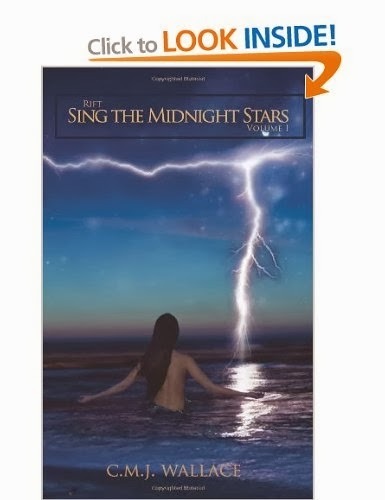 This fantasy is full of imagination and introduced me to a thread of magic I hadn’t come across before. Whether that type of magic is entirely the invention of the author or not I don’t know, but it’s a very effective story element.
This fantasy is full of imagination and introduced me to a thread of magic I hadn’t come across before. Whether that type of magic is entirely the invention of the author or not I don’t know, but it’s a very effective story element. I was hooked straight away by this tale of intrigue, with the mad king intent on apparent self-destruction as he greedily sets about obliterating all that is good in his kingdom. The central protagonists, male and female, are fully realised characters about whom the reader very quickly cares. The lesser characters are cleverly drawn so that they, too, are real people. Many different quirks and faults are employed to make the cast into real individuals.
The story moves quickly and the pace only slows when appropriate, allowing the reader to gather background information and details of relationships before being plunged into further action. I found the balance of description and action very well done.
I read this in ebook form and wasn’t able to access a map, which would have been a useful addition. I don’t know whether the book comes with a map or not.
Personal commitments prevented me reading this lengthy tome at one sitting, but I was always eager to get back to it. It’s a page-turner. If you like your fantasy told with skill, passion and imagination, you’ll enjoy this read. I thoroughly recommend it.

Published on February 01, 2014 00:34
January 31, 2014
The Writer’s Priorities. Part 2
 Portrait of Samuel Johnson commissioned for Henry Thrale's Streatham Park gallery (Photo credit: Wikipedia)Timing, they say, is all. An odd coincidence occurred today. I was due to write this post, as a follow-up to last week’s effort. But, I’d also determined I would enter at least 4 writing contest during the month, and I’d only managed 2 entries by yesterday. In preparing for the other two, I went online and discovered at the top of my emails an alert to the Writers’ Village blog I follow for its excellent advice and content. The subject matter was ‘A Simple Idea That Can Sell a MillionBooks’. Bearing in mind what I said last week about money as a motivator, I thought I should at least read the piece. If you click on the title, it’ll take you to it.
Portrait of Samuel Johnson commissioned for Henry Thrale's Streatham Park gallery (Photo credit: Wikipedia)Timing, they say, is all. An odd coincidence occurred today. I was due to write this post, as a follow-up to last week’s effort. But, I’d also determined I would enter at least 4 writing contest during the month, and I’d only managed 2 entries by yesterday. In preparing for the other two, I went online and discovered at the top of my emails an alert to the Writers’ Village blog I follow for its excellent advice and content. The subject matter was ‘A Simple Idea That Can Sell a MillionBooks’. Bearing in mind what I said last week about money as a motivator, I thought I should at least read the piece. If you click on the title, it’ll take you to it.It was one of those posts, of which there are many these days, promoting the idea that money can be made from writing by doing a great deal of it and getting it published, more or less regardless of the quality. It’s a persuasive argument for a lot of would-be writers and there’s evidence that this approach does, indeed, earn its better practitioners money. I had to make a comment, of course.
So; back to the theme of this post. Priorities. Do you know what yours are? Are you driven by money? James Boswell, in his Life of Samuel Johnson , wrote, ‘No man but a blockhead ever wrote, except for money’. However, Samuel Johnson himself wrote, ‘The only end of writing is to enable the readers better to enjoy life, or better to endure it’.
My own primary aim is to increase my number of readers. It’s been suggested that the easiest way to do so is to charge nothing for the books. I do have a short story offered free; But, Baby, It’s Cold Outside is a bit of seasonal cheer to make readers smile. But it’s been proved, many times, that in general terms, people place little value on something that has no worth placed on it by the producer. So, I compromise and price my books at what seems a fair cost for the piece on offer. Before I place a piece to market, I spend as much time as is needed to make it the very best I can. My priority has been quality at the expense of quantity.
Perhaps I’ve been too concerned with this aspect, since it’s clear that many readers are not really concerned with the quality of the writing. I’m not sure, to be honest. But, in the interests of discovering whether my writing can stand the rigours of quantity and remain both accessible and readable, I’ve decided to devote this year to more in the way of quantity.
So far, I have 7 books available, published over a period of 5 years. This year I aim to produce a further 4 titles. Nothing like the quantity that many of the genre/formula-fitting writers produce, of course. But a challenge, if quality is to be maintained.
So, my priority for this year is to write, and publish, 4 new titles. This means that certain other activities will necessarily have to be curtailed. Much less time with Twitter, Facebook and the other social networks to which I contribute. But not a complete cessation, of course. I will still need to let people know about my writing, after all.
Last week, when I wrote the first part of this post, I had little idea where I would end up. I’ve now set my aims. Do you have targets, aims, priorities in your writing life? If so, please share them with us here.
Oh, and I will try to maintain a post each week here on the blog, of course.Related articles
 An author's life is not a happy one
An author's life is not a happy one
 Review: Life of Johnson
Review: Life of Johnson

Published on January 31, 2014 08:43
January 24, 2014
The Writer’s Priorities. Part 1
 We’re creative souls, we who write stories, not generally the disciplined and single-minded types for whom regulation and habit overtake our free spirits to the exclusion of all else. No, those for whom self-discipline and ultra-focus are paramount are, generally speaking, business-minded; people for whom money is the primary concern. That’s not to say that these qualities are undesirable, simply that they’re not the most important elements of our make-up.
We’re creative souls, we who write stories, not generally the disciplined and single-minded types for whom regulation and habit overtake our free spirits to the exclusion of all else. No, those for whom self-discipline and ultra-focus are paramount are, generally speaking, business-minded; people for whom money is the primary concern. That’s not to say that these qualities are undesirable, simply that they’re not the most important elements of our make-up.As artists (sorry if that term makes you uncomfortable, but perhaps you should be looking at your view of your role as a creative spirit?), we’re more organic, less easily defined by rules, more open to the bending and even the ditching of external influences on our behaviour.
So, where am I going with this?
Let’s face it, if we call ourselves writers, our first love, our primary drive, is writing: yes? If your answer to that is not ‘yes’ then I suggest you examine your reasons for placing words in specific order on pages. It may be that you’re an entrepreneur who’s spotted an opening in a market that just happens to involve the skill of writing. Perhaps you’ve seen the zillions paid for certain best-sellers, and identified a niche you could fill by writing the same story with different names and locations. It works. It’s been done countless times. But it doesn’t make you a writer; it makes you a businessman/woman.
Writers of fiction are more concerned with the words they present, the stories they tell, the effects of those compositions on their readers. Money, fame, success are all viewed as ancillary to the craft and inspiration of actually setting the right word in the right place. Imagination is the primary resource of the storyteller and the emotional punch of the story is the reward.
I’m not making judgments here. If the business approach suits you, that’s your choice. If, on the other hand, the role of the storyteller, the ancient role that started around the fire in the mouth of the cave as a way to explain the world and its wonders and terrors, drives you, then that is also your choice. Unfortunately, for those of us so inclined the world has moved into an era where the majority of the advice, help and support for writers is aimed at those for whom money is the major mover. Talent, it seems, is less valuable.
It’s very easy to be drawn into the world of marketing, promotion, advertising and generally concentrating on making ‘a living’. And, of course, we live in a world where making a living is paramount to mere survival, so the pressures are intense.
The issue then, for those of us who are essentially creative beings, is achieving a balance between making enough to allow us to survive and giving ourselves the freedom of thought and action that will nurture and develop our talents as tellers of tales.
I write this post as a taster only. As a way to introduce the idea that we may need to examine our priorities if we’re to lead full and rewarding lives as writers. For my personal approach, watch this space. I’ll provide my answers soon; just as soon as I’ve reached an actual conclusion, in fact!
And, for the time being, I ask you to consider just one question:
Why do you write?
Published on January 24, 2014 09:21
January 19, 2014
The God of Small Things, by Arundhati Roy, Reviewed.
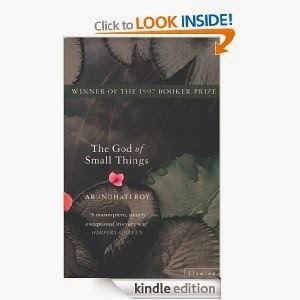 A prose poem of a novel, with bite. This Indian tale of love, loss, class and betrayal starts, against all the literary school advice, with the weather. But the language is so engaging, so intriguing, that the reader is drawn into this strange world at once.
A prose poem of a novel, with bite. This Indian tale of love, loss, class and betrayal starts, against all the literary school advice, with the weather. But the language is so engaging, so intriguing, that the reader is drawn into this strange world at once.I love well-rounded characters and this book explodes with them. I love the use of good and entertaining English and this book drips with it. I won’t bore you with a synopsis; there are plenty of those around if you want a truncated version of the story. Suffice to say that the story centres on the relationships within a middle class business family and those that family loves and relies upon.
I learned a great deal about Indian life during the read. The chaos, out-dated traditions, values, iniquities of the caste system, attitudes to authority, God, and religion are all exposed in the narrative. The climate and the landscape become added characters, playing their parts in this complex tale and bringing even more life to a story already teeming with it.
There are flaws, for a reader from England. There are references to Indian culture, tradition and history that arrive unannounced and leave without explanation, often failing to reveal their origins or meanings in the process. And there are very short, occasional, passages in an untranslated language I could not identify or understand. How much of the richness of the novel I failed to appreciate because of these flaws, I have no way of knowing.
There are a couple of chapters that, for me, appeared to serve no purpose in the story and I confess to skipping through those.
The book is written in a way that keeps the reader engaged, not through action or tension necessarily, but through the exquisite combination of words. This is poetry presented as prose. And the final chapter is so brilliantly drawn, so brutally emotional, that it left me feeling raw; the empathy imposed is such that I doubt any sensitive reader could leave it without tears.
I loved this book, and read the last half at one sitting, reluctant to put it down even though there were fairly pressing reasons I should do so. Thoroughly recommended for those readers who love literature in its accessible form and for whom a story of people in love matters. It’s no surprise this won the Booker Prize.
Related articles
 Review: Arundhati Roy, the God of Small Things, 1997 Man Booker Prize Winner
Review: Arundhati Roy, the God of Small Things, 1997 Man Booker Prize Winner
 The God of Small Things, Arundhati Roy
The God of Small Things, Arundhati Roy
 On The God of Small Things
On The God of Small Things
 Review: The God of Small Things - Arundhati Roy (1997 winner)
Review: The God of Small Things - Arundhati Roy (1997 winner)
 Arundhati Roy
Arundhati Roy

Published on January 19, 2014 00:45
January 18, 2014
New Group Blog Up and Running
As a member of a writing group celebrating its Silver Jubilee this year, I'm proud to announce that Hornsea Writers now has its own blog.
We'll be using this platform to announce news, achievements and events. It's a central point for our writing activities and allows readers to discover what other group members are up to.
We're a disparate collection but have in common that we're all published, professional authors. The site is simple, so there are few widgets. But, should you want to keep track of us there, please scroll to the foot of the page, where you'll find the opportunity to follow by email.
This venture marks the start of a new phase for us all. Always a supportive gathering, we're moving forward with the times and ensuring we have a proper web presence.
In case you missed the link above, here it is again.
Related articles Interview with Linda Acaster from Hornsea Writers.
Interview with Linda Acaster from Hornsea Writers.

We'll be using this platform to announce news, achievements and events. It's a central point for our writing activities and allows readers to discover what other group members are up to.
We're a disparate collection but have in common that we're all published, professional authors. The site is simple, so there are few widgets. But, should you want to keep track of us there, please scroll to the foot of the page, where you'll find the opportunity to follow by email.
This venture marks the start of a new phase for us all. Always a supportive gathering, we're moving forward with the times and ensuring we have a proper web presence.
In case you missed the link above, here it is again.
Related articles
 Interview with Linda Acaster from Hornsea Writers.
Interview with Linda Acaster from Hornsea Writers.

Published on January 18, 2014 00:42
January 12, 2014
The Mark of the Mage, by R.K. Ryals, Reviewed
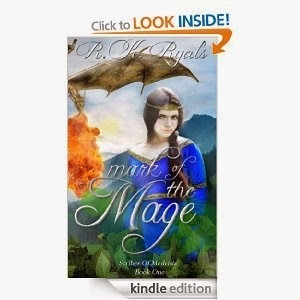 This is fantasy, with the usual components of magic, dragons, swords and sorcery, but made special by the use of a female lead protagonist and good writing.
This is fantasy, with the usual components of magic, dragons, swords and sorcery, but made special by the use of a female lead protagonist and good writing.The Mark of the Mage tells the story of Stone, illegitimate daughter of a high ranking noble who has lost favour with the evil king. She’s a scribe in a time when knowledge is made suspect. There are echoes here of the terror of reigns like that of the Khmer Rouge but the reader isn’t lost without familiarity with such parallels. I don’t want to give too much away, but I think I can reveal that there’s a burgeoning love interest, which gives the story a more rounded feel than I’ve come across in some fantasy novels. This is the first in a series and I look forward to the follow-ons.
The characters are well drawn and have their faults, making them believable people. The writing is sharp and sympathetic enough to engender empathy. Descriptions are built into the action, so that settings are truly part of the story rather than the add-ons that interrupt less well-told tales. And the lesser characters are presented with as much care as the main players, so that they also become people to care about.
I enjoyed this book and recommend it to all those who like a little more than the usual elements in their fantasy fiction. A good read that kept me entertained and engaged throughout.Related articles
 The Singing River by R.K Ryals
The Singing River by R.K Ryals
 Fantasy Reading, Writing, and more Reading
Fantasy Reading, Writing, and more Reading

Published on January 12, 2014 00:01
January 9, 2014
Starring the Reviews
 Reader or writer (and hopefully, the latter makes you both, since a writer who doesn’t read is, frankly,not doing the job properly), we consume books and often want to share our opinions on them. So, we review. Many sites where reviews appear use a star system to grade them. I’m not going to list them all, but I’ll use three of the most popular as examples and try to gain a feeling for what reviewers might understand by these gradings.
Reader or writer (and hopefully, the latter makes you both, since a writer who doesn’t read is, frankly,not doing the job properly), we consume books and often want to share our opinions on them. So, we review. Many sites where reviews appear use a star system to grade them. I’m not going to list them all, but I’ll use three of the most popular as examples and try to gain a feeling for what reviewers might understand by these gradings.We all know that 5 star reviews are considered the pinnacle from the point of view of the writer assessing success or otherwise, and thought of as a damn good guide to readability by readers. So, the grading is quite important to all of us. But what does it mean?
If you hover over the stars on Goodreads, you’ll get the following results: 1* Did not like it, 2* It was OK, 3* Liked it, 4* Really liked it, 5* It was amazing.
Do the same for Amazon and you get these results: 1* I hate it, 2* I don’t like it, 3* It’s okay, 4* I like it, 5* I love it.
With Smashwords, hovering over the stars produces no response and I can find no definitions at all on the site (that’s not to say they don’t exist, of course, just that I can’t discover them!).
So, there’s no consistency in the systems. 4 stars can mean ‘I like it’ or ‘I really like it’ or whatever the reviewer considers is the hidden meaning of the Smashwords stars. Similarly, if a book is ‘okay’, then it could be awarded 2, 3 or 1-5 stars depending which system in use. And, I don’t know about you, but I can ‘love’ a book without necessarily considering it to be ‘amazing’.
My point? This system is used by readers to gauge the potential readability of a book. I’m certain that many readers won’t get beyond that * award, making their decisions whether or not to read/buy, based entirely on this rather arbitrary symbol.
The tool isn’t up to the purpose for which it was introduced. Perhaps, as readers, and writers, we should get together and demand that the different sites conform to a uniform system so that everybody knows exactly what is actually meant by these symbols. Or perhaps you like the variations. Either way, I’d love to know what you think.Related articles
 Usage surges at Smashwords and Wattpad
Usage surges at Smashwords and Wattpad
 Smash!
Smash!
 If the eBook market is Flattening Out Then How Come Smashwords's Revenues Grew by a Third in 2013?
If the eBook market is Flattening Out Then How Come Smashwords's Revenues Grew by a Third in 2013?
 Witty's review of Gloria's Revenge by Nelle L'Amour
Witty's review of Gloria's Revenge by Nelle L'Amour
 Tips on Thursday: Ratings
Tips on Thursday: Ratings
 How Amazon could Improve Book Reviews
How Amazon could Improve Book Reviews

Published on January 09, 2014 02:46
January 2, 2014
What Will 2014 Bring?
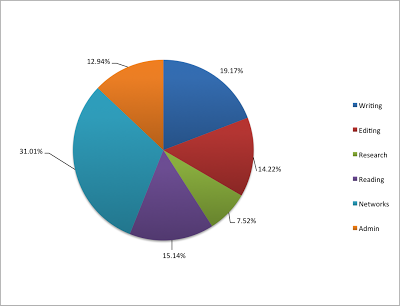 Last year, around this time, I produced a blog post on my writing activity during 2012. Because I find it useful to detail my activities, and it may interest those who follow the blog, I’m repeating that exercise today for 2013.
Last year, around this time, I produced a blog post on my writing activity during 2012. Because I find it useful to detail my activities, and it may interest those who follow the blog, I’m repeating that exercise today for 2013.It’s been a peculiar year in many ways. Socially and professionally there have been many events and changes. I retired from employment in April and celebrated my 65th birthday in May. In September, my wife and I celebrated our 25th wedding anniversary and, in the same month, our daughter reached the milestone age of 21. In December, my aunt reached the great age of 100. So many reasons to celebrate, and the freedom to do so in terms of travel and time.
I changed from PC to desktop iMac, an investment I’ve really appreciated in spite of a few disappointments (Apple’s definition of ‘intuitive’ is clearly not the same as mine!). But, in many ways this has been a positive change. I’m still learning, though. And, possibly the single most irritating aspect is the lack of a # on the keyboard, an exclusion that makes hash-tagging Twitter and Facebook posts far less simple than it otherwise would be: Apple take note!
I spent a good deal of time editing the first 2 volumes of my fantasy trilogy, since Fantastic BooksPublishing have accepted the work and will be publishing volume one, A Seared Sky – Joinings, soon. I also spent a lot of hours writing book 3 of the series. This year will see the editing of that volume, of course.
I wrote a few short stories and entered a couple of contests, though fewer than I intended. I made a start at writing poetry, and this is an activity I intend to increase over the coming years: it’s a different skill from prose writing and has a beneficial effect on that, developing the understanding of metaphor and simile as well as encouraging brevity.
On the admin side, I’ve continued with research and compilation of details of writing contests and you can find this regularly up-dated information under the Writing Contests tab above. Hope it’s useful.
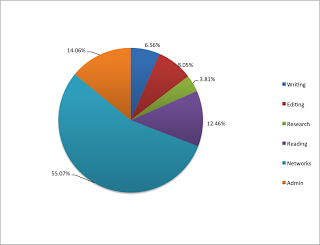 Much of December I spent in experimentation on social networking. (The chart illustrates the portion of time spent on this) Really, I did this to confirm suspicions I acquired last year about the effectiveness of such activity for an author. It seemed to me that the apparently ubiquitous ‘author platform’ may be less than effective in actually garnering readers and selling books. This year’s activity has confirmed those suspicions and I shall be curbing my social networking activity this year to concentrate on writing, submitting and publishing stories, since it’s apparent that those writers who achieve wide readerships are the ones who publish more work. As I enjoy the actual writing more than any other of the activities that surround authorship, it will be a pleasure for me to take this turn.
Much of December I spent in experimentation on social networking. (The chart illustrates the portion of time spent on this) Really, I did this to confirm suspicions I acquired last year about the effectiveness of such activity for an author. It seemed to me that the apparently ubiquitous ‘author platform’ may be less than effective in actually garnering readers and selling books. This year’s activity has confirmed those suspicions and I shall be curbing my social networking activity this year to concentrate on writing, submitting and publishing stories, since it’s apparent that those writers who achieve wide readerships are the ones who publish more work. As I enjoy the actual writing more than any other of the activities that surround authorship, it will be a pleasure for me to take this turn.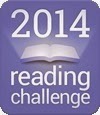 I’m also intending to read more. I read 53 books in 2013 (most of them I reviewed as well) and I’ve set myself a target of 52 books over the year, using the Goodreads Reading Challenge as incentive for this. I do, however, expect to exceed this target.
I’m also intending to read more. I read 53 books in 2013 (most of them I reviewed as well) and I’ve set myself a target of 52 books over the year, using the Goodreads Reading Challenge as incentive for this. I do, however, expect to exceed this target.The chart at the top of this post shows the proportion of time I’ve spent on the various activities during the year. It’s noticeable that the activity on which I’ve spent most time is networking. Whilst there’s some satisfaction and much pleasure to be gained from interacting (not to mention the way it can help others), I have my doubts about its real value in relation to the activities of an author. The coming year will see a great deal more actual writing, editing, submission and publishing. I’m a writer, and writers write, after all.
So, to the comparison figures, where I list ‘achievements’ for the year. I gave a list for 2012, which I’ve repeated here, so we can see the comparison with 2013. Please note, it’s the left hand column that shows this year’s activities.
2013 2012
Published work:None! Sensuous Touches, an erotic anthology.Heir to Death’s Folly, a gothic horror short story.Rebirth, my contribution to the sci-fi anthology, Fusion, published by Fantastic Books Publishing.
Writing Contests:2 entered. No success 4 entered, 1 short-listed.
Social Networking as at the end of each year:2013 2012Blog: 1181 posts 1062 posts491 followers 447 followers181,769 page views 85,511 page views29,250 visitors identifying location 18,882 visitors identifying location
Facebook:Author Page: 569 ‘Likes’ 379 ‘Likes’Personal Profile: 1,795 Friends 1,599 Friends
Goodreads:1,001 books listed as ‘Read’ 882 books listed as ‘Read’177 Reviews written 130 Reviews written125 titles in ‘to read’ list 136 titles in ‘to read’ list3,231 Friends 2,118 Friends
LinkedIn:2,958 Contacts 2,274 Contacts
Pinterest:1,123 Followers 662 Followers7,305 Pins on 33 boards 4,774 on 32 boards
Google+:559 in my circles 336 in my circles413 circles including me 183 circles including me
Twitter:8,759 Following me 5,110 Following me8,758 I Follow 5,012 I Follow22,033 Tweets 11,823 Tweets
As you can see, my social networks have all expanded quite significantly. However, this increase has had little impact on the number of books I’ve sold, which is you can expect less social activity this year and more in the way of writing. I’ll continue to record that here on the blog.
By all means add me on your social networks: I’m cutting down on the activity, not stopping it completely! Let’s see what 2014 has to offer, shall we?Related articles
 2014! New Year, New Goals!
2014! New Year, New Goals!
 Start as we mean to go on!
Start as we mean to go on!

Published on January 02, 2014 07:32
December 31, 2013
Happy New Year 2014
 Sunset or sunrise? You choose.
Sunset or sunrise? You choose.Another spell of 365 days has passed. The New Year promises much, is replete with potential. Will we harvest the fruits of our talent and labour? Or will we fritter away the next year, as we might have done the last? That's the beauty of a New Year: it gives us hope and choice. Whether we select 'same old, same old' or opt for 'everything changes' or some road between is entirely up to us.
I prefer the New Year to Christmas. Xmas is all about children (bless their little hearts!) and the commercialisation of ritual giving. But New Year marks a new opportunity, a point of change, a fulcrum for potential.
New Year Resolutions will proliferate; but not from me. I make only one resolution: to make no resolutions.
But I have intentions, dreams, plans, hopes. There will be more books from my pounded keyboard, posts on this blog, tweets via that truncated network, pins to the boards of interest, status updates on the book of my face, additions to the google plus, comments on the output of others. I will read more and record that activity on Goodreads, reviewing those volumes that please me. But, more than anything else, this new season of days will find me writing, writing writing.
I wish all of you all that you wish for yourselves. May 2014 be THE year for all of us!
Related articles
 Happy 2014...
Happy 2014...
 2014
2014
 Happy Brew Year!
Happy Brew Year!
 Happy New Year 2014!
Happy New Year 2014!
 2014 = New Year, New You
2014 = New Year, New You

Published on December 31, 2013 09:11



